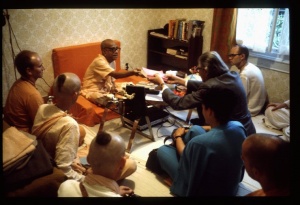SB 10.46.29: Difference between revisions
m (1 revision(s)) |
(Vanibot #0018 edit: make synonym terms in Sanskrit italic in SB - Vanisource) |
||
| Line 1: | Line 1: | ||
{{info | {{info | ||
|speaker= | |speaker=Śukadeva Gosvāmī | ||
|listener=King | |listener=King Parīkṣit | ||
}} | }} | ||
[[Category:Srimad-Bhagavatam - Canto 10 Chapter 46]] | |||
[[Category:Bhagavatam Verses Spoken by Sukadeva Gosvami - Vanisource|104629]] | |||
<div style="float:left">'''[[Srimad-Bhagavatam]] - [[SB 10|Tenth Canto]] - [[SB 10.46: Uddhava Visits Vrndavana|Chapter 46: Uddhava Visits Vṛndāvana]]'''</div> | |||
<div style="float:right">[[File:Go-previous.png|link=SB 10.46.28]] '''[[SB 10.46.28]] - [[SB 10.46.30]]''' [[File:Go-next.png|link=SB 10.46.30]]</div> | |||
{{RandomImage}} | |||
{{SBnotice}} | |||
==== TEXT 29 ==== | ==== TEXT 29 ==== | ||
<div | <div class="verse"> | ||
tayor itthaṁ bhagavati | :tayor itthaṁ bhagavati | ||
kṛṣṇe nanda-yaśodayoḥ | :kṛṣṇe nanda-yaśodayoḥ | ||
vīkṣyānurāgaṁ paramaṁ | :vīkṣyānurāgaṁ paramaṁ | ||
nandam āhoddhavo mudā | :nandam āhoddhavo mudā | ||
</div> | </div> | ||
| Line 17: | Line 22: | ||
==== SYNONYMS ==== | ==== SYNONYMS ==== | ||
<div | <div class="synonyms"> | ||
''tayoḥ''—of the two of them; ''ittham''—like this; ''bhagavati''—for the Supreme Personality of Godhead; ''kṛṣṇe''—Lord Kṛṣṇa; ''nanda-yaśodayoḥ''—of Nanda and Yaśodā; ''vīkṣya''—clearly seeing; ''anurāgam''—the loving attraction; ''paramam''—supreme; ''nandam''—to Nanda; ''āha''—spoke; ''uddhavaḥ''—Uddhava; ''mudā''—with joy. | |||
</div> | </div> | ||
{{SBcollapse}} | |||
==== TRANSLATION ==== | ==== TRANSLATION ==== | ||
<div | <div class="translation"> | ||
Uddhava then joyfully addressed Nanda Mahārāja, having clearly seen the supreme loving attraction he and Yaśodā felt for Kṛṣṇa, the Supreme Personality of Godhead. | Uddhava then joyfully addressed Nanda Mahārāja, having clearly seen the supreme loving attraction he and Yaśodā felt for Kṛṣṇa, the Supreme Personality of Godhead. | ||
</div> | </div> | ||
| Line 31: | Line 36: | ||
==== PURPORT ==== | ==== PURPORT ==== | ||
<div | <div class="purport"> | ||
If Uddhava had seen Nanda and Yaśodā actually suffering, he would not have reacted with joy. But in fact all emotions on the spiritual platform are transcendental bliss. The so-called anguish of the pure devotees is another form of loving ecstasy. This was clearly seen by Uddhava, and thus he spoke as follows. | If Uddhava had seen Nanda and Yaśodā actually suffering, he would not have reacted with joy. But in fact all emotions on the spiritual platform are transcendental bliss. The so-called anguish of the pure devotees is another form of loving ecstasy. This was clearly seen by Uddhava, and thus he spoke as follows. | ||
</div> | </div> | ||
__NOTOC__ | </div> | ||
</div> | |||
<div style="float:right">[[File:Go-previous.png|link=SB 10.46.28]] '''[[SB 10.46.28]] - [[SB 10.46.30]]''' [[File:Go-next.png|link=SB 10.46.30]]</div> | |||
__NOTOC__ | |||
__NOEDITSECTION__ | |||
Revision as of 15:36, 1 December 2017

A.C. Bhaktivedanta Swami Prabhupada
Please note: The synonyms, translation and purport of this verse were composed by disciples of Śrīla Prabhupāda
TEXT 29
- tayor itthaṁ bhagavati
- kṛṣṇe nanda-yaśodayoḥ
- vīkṣyānurāgaṁ paramaṁ
- nandam āhoddhavo mudā
SYNONYMS
tayoḥ—of the two of them; ittham—like this; bhagavati—for the Supreme Personality of Godhead; kṛṣṇe—Lord Kṛṣṇa; nanda-yaśodayoḥ—of Nanda and Yaśodā; vīkṣya—clearly seeing; anurāgam—the loving attraction; paramam—supreme; nandam—to Nanda; āha—spoke; uddhavaḥ—Uddhava; mudā—with joy.
Translation and purport composed by disciples of Śrīla Prabhupāda
TRANSLATION
Uddhava then joyfully addressed Nanda Mahārāja, having clearly seen the supreme loving attraction he and Yaśodā felt for Kṛṣṇa, the Supreme Personality of Godhead.
PURPORT
If Uddhava had seen Nanda and Yaśodā actually suffering, he would not have reacted with joy. But in fact all emotions on the spiritual platform are transcendental bliss. The so-called anguish of the pure devotees is another form of loving ecstasy. This was clearly seen by Uddhava, and thus he spoke as follows.